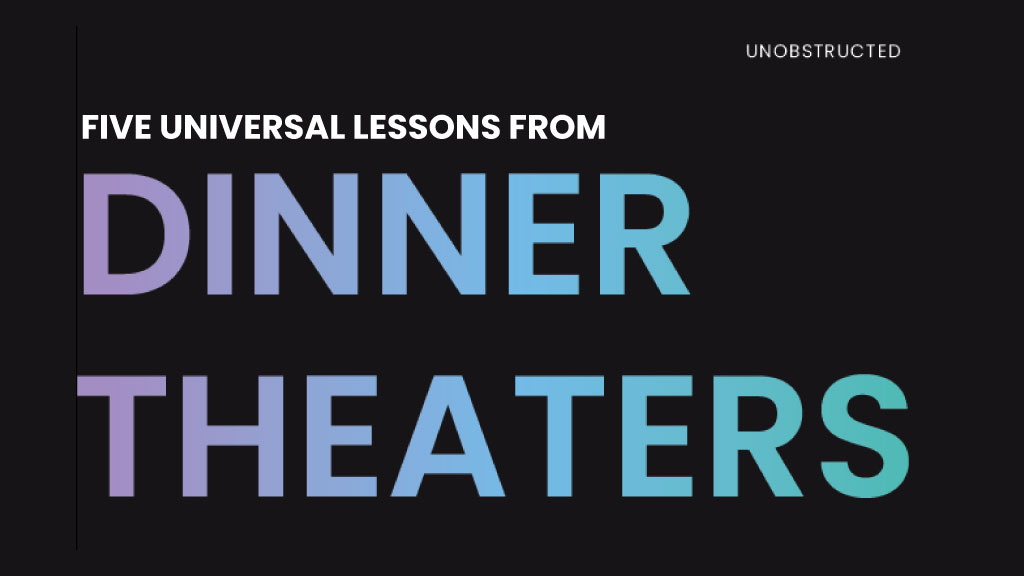Dinner theaters operate in a unique corner of the live event world, combining entertainment with dining to create a seamless evening of experiences for their patrons. While the blend of food and performances sets them apart from traditional venues, there are key strategies they use that any venue can adopt. From precise communication to managing complex logistics, dinner theaters excel in ways that live event venues of all types can learn from. Here are some universal lessons that can help you elevate your venue’s operations and patron experience.
PERFECTING PATRON COMMUNICATION
Every Detail Counts
When running a dinner theater, clear communication is paramount. Not only do patrons need to know when a show begins, but they also need to know when to arrive for dinner service, how long it will last, and how that impacts their evening as a whole. This level of detail goes beyond standard “doors open” notifications common in most venues. Dinner theaters have mastered the art of guiding their guests through the entire experience to avoid confusion and ensure satisfaction.
KEY TAKEAWAY:
Clear, thorough communication is key. Whether it’s a concert, a comedy night, or a play, patrons need more than just a ticket with a showtime. Consider pre-event emails that clarify parking information, venue entry times, and any other logistics that can remove guesswork for attendees. A smooth, well-informed arrival sets the tone for a great event.
TAILORING THE EXPERIENCE TO YOUR AUDIENCE
Dinner theaters know their audience intimately and often cater their operations to meet specific guest preferences. For example, they might use segmented messaging for season ticket holders or VIP guests, ensuring that high-value patrons feel recognized and appreciated. They may also modify their services based on the preferences of their core demographic, ensuring that the experience aligns with expectations.
KEY TAKEAWAY:
Personalization matters. By getting to know your audience and understanding their preferences, you can deliver a more customized experience. For example, offering tailored discounts, targeted pre-event communications, or exclusive content for certain guest segments can make attendees feel valued and more connected to your venue. Know who’s coming to your event and adjust your approach accordingly to meet their specific needs.
MANAGING COMPLEX LOGISTICS WITHOUT MISSING A BEAT
Dinner theaters deal with highly complex logistics—seating arrangements, food service coordination, and spot-on timing between courses and performances. It’s a balancing act that requires precision. They ensure that meals are served on time, guests are seated appropriately, and that the performance transitions smoothly from dining to the show itself, without rushing patrons or creating dead time.
KEY TAKEAWAY:
All event venues can benefit from attention to logistical flow. Whether you’re managing seating charts for a reserved-seating concert or coordinating multiple acts in a festival setting, details matter. Smooth transitions between parts of an event—whether it’s from the lobby to the main hall or between acts on stage—help keep the energy high and patrons engaged. Planning every aspect in advance and ensuring all staff understand their roles can elevate the entire experience.
FULFILLING EXPECTATIONS THROUGH CONSISTENT DELIVERY
Dinner theaters understand that they are not just selling tickets to a show—they are selling an experience. This means every element, from the food to the performance, must align with patron expectations. Guests expect the quality of the meal and service to match the level of entertainment, and it’s up to the venue to deliver on every front, consistently.
KEY TAKEAWAY:
Whether you run a theater, a music hall, or a sports arena, consistency in delivering a high-quality experience is crucial. If patrons expect a certain level of service, ensure you meet or exceed that expectation every time. This could mean anything from streamlined entry processes to providing excellent customer service throughout the event. Consistency builds trust and keeps patrons coming back.
USING POST-EVENT COMMUNICAATION TO BUILD LONG-TERM RELATIONSHIPS
Dinner theaters often follow up with patrons after the event to thank them for attending, ask for feedback, or promote future shows. This simple gesture not only keeps the theater top-of-mind for future events but also shows patrons that they are valued. Personalized post-event outreach can deepen the relationship between the venue and its audience.
KEY TAKEAWAY:
All venues can benefit from post-event communication. Follow up with attendees to thank them for their support, ask for feedback on their experience, and share information about upcoming events. This keeps the momentum going and encourages repeat attendance. Additionally, gathering feedback helps you identify areas for improvement, ensuring your venue continues to evolve and meet guest expectations.
Want to hear more? Click here to watch our entire Dinner Theaters roundtable.

